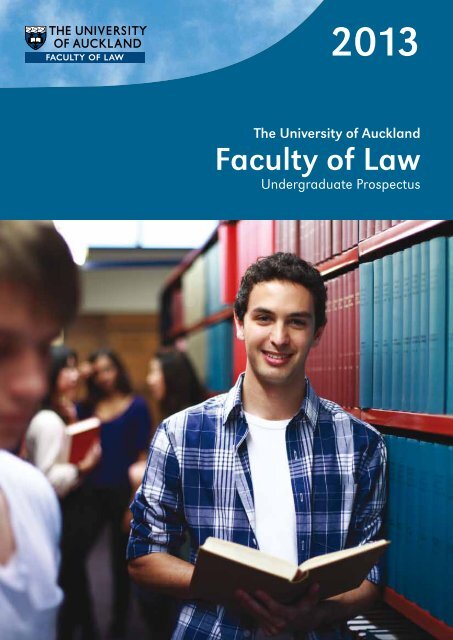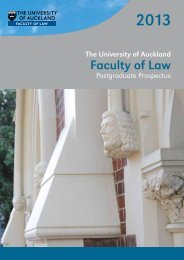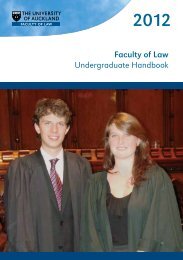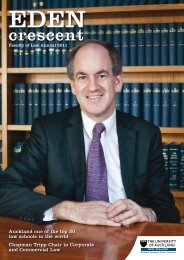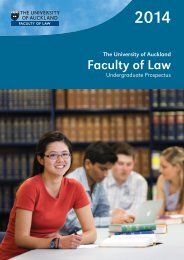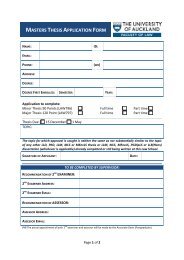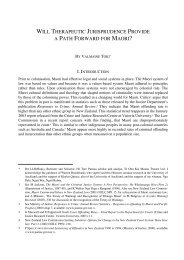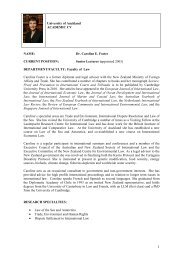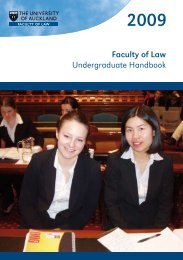Frequently Asked Questions - Faculty of Law - The University of ...
Frequently Asked Questions - Faculty of Law - The University of ...
Frequently Asked Questions - Faculty of Law - The University of ...
You also want an ePaper? Increase the reach of your titles
YUMPU automatically turns print PDFs into web optimized ePapers that Google loves.
2013<strong>The</strong> <strong>University</strong> <strong>of</strong> Auckland<strong>Faculty</strong> <strong>of</strong> <strong>Law</strong>Undergraduate ProspectusNeed help?AskAuckland has frequently asked questions 24 hours a day, 7 days aweek. Visit www.askauckland.ac.nz.
Welcome to the <strong>Faculty</strong> <strong>of</strong> <strong>Law</strong>This is an exciting time for the Auckland <strong>Law</strong> School. Last year it was ranked one <strong>of</strong> the top twentylaw schools in the world in the prestigious QS World <strong>University</strong> Rankings.<strong>The</strong> strength <strong>of</strong> any law school lies in the calibre <strong>of</strong> its staff and students,the resources <strong>of</strong> its library, and the support it gets from the pr<strong>of</strong>essionand alumni. <strong>The</strong> Auckland <strong>Law</strong> School is very fortunate on every score.Our academic staff produces world-class research, the Davis <strong>Law</strong> Libraryhas New Zealand’s most extensive collection <strong>of</strong> legal research materials,and we have higher entry standards for our degrees than any other NewZealand law school, meaning that our graduates are highly sought after.Our students epitomize Auckland’s philosophy <strong>of</strong> academic rigourcoupled with enthusiasm for the law. For the fifth consecutive year,Auckland students have won the national mooting championships andwill be representing New Zealand overseas. We have one <strong>of</strong> the mostactive and successful law student societies in the country. From the <strong>Law</strong>Revue to student competitions, from social and sports events to seminarsand workshops, there are countless opportunities to participate, meetother law students and forge life-long friendships.Situated in the heart <strong>of</strong> the legal precinct, the Auckland <strong>Law</strong> School hasstrong links to the legal pr<strong>of</strong>ession and judiciary. <strong>The</strong> School provides acomplete legal education, preparing students for legal practice as well asmany other careers in an internationalised world.DR ANDREW STOCKLEYDean <strong>of</strong> <strong>Law</strong><strong>The</strong> <strong>University</strong> <strong>of</strong> AucklandWhy study with us?<strong>Law</strong> at Auckland is challenging, exciting and taught by some <strong>of</strong> thebest-known legal scholars in the country. We teach students how to thinkcritically, how to analyse and to persuade by logical argument. <strong>The</strong>Auckland <strong>Law</strong> School:• Is the top-ranked law school in New Zealand and one <strong>of</strong> the best lawschools in the world.*• Provides small group teaching at all levels and <strong>of</strong>fers the largest range<strong>of</strong> undergraduate courses <strong>of</strong> any <strong>of</strong> the New Zealand law schools.• Has the highest entry standards for second year law, meaninggraduates are highly sought after.• Allows you to combine your law degree with a wide range <strong>of</strong> conjointprogrammes (in arts, commerce, engineering, health sciences, propertyor science).• Has outstanding facilities including the Davis <strong>Law</strong> Library, NewZealand’s leading legal research library.• Is situated in the heart <strong>of</strong> the legal precinct, next to the High Court andthe nation’s leading law firms.• Offers an extensive study abroad programme, assisting students spenda semester overseas at another top law school.Where can the LLB take you?Auckland law graduates are highly sought after. In any given year,about half our graduates take up positions in New Zealand law firms,while the other half begin their careers in other pr<strong>of</strong>essionalorganisations. <strong>The</strong>se include accounting and consulting firms; businessand industry; national and local government; teaching, research andjournalism; international, environmental and other non-governmentorganisations.Our graduates can be found practising law in New Zealand andworldwide - many <strong>of</strong> our former students work for leading law firms inLondon, New York, Sydney, Hong Kong, Singapore and other places.Some <strong>of</strong> our top students go on to study for the LLM and PhD degrees.<strong>The</strong> Auckland <strong>Law</strong> School <strong>of</strong>fers the most extensive postgraduateprogramme in the country. Our students regularly win scholarships andprizes to continue their studies overseas. Some <strong>of</strong> last year’s graduatesare now pursuing higher degrees at Oxford, Cambridge, Harvard, Yaleand Columbia, among other top overseas universities.Becoming a barrister and solicitorAfter completing the LLB or LLB(Hons) degree, if you wish to beadmitted as a barrister and solicitor, you must complete a three-monthpr<strong>of</strong>essional Legal Studies course.• Provides a wealth <strong>of</strong> opportunities for top students, including being ableto work on the Auckland <strong>Law</strong> Review, take part in the Equal Justiceprogramme, and participate in mooting, sentencing advocacy andmany other competitions.• Has very active and supportive Mäori and Pacific Island law studentsocieties and programmes.* See www.auckland.ac.nz/leadinguniversity
Explore our range <strong>of</strong> programmesBachelor <strong>of</strong> <strong>Law</strong>s (LLB)Quick Facts – LLBFull time: 4 yearsTaught at: City CampusPoints per degree: 480Application closing dates:1 December 2012 for LLB Part II8 December 2012 for LLB Part IClasses start: 4 March 2013<strong>The</strong> LLB is a four-year (eight-semester) degree for a fulltime student. <strong>The</strong>degree is comprised <strong>of</strong> 480 points, studied in four parts (Parts I – IV).<strong>The</strong> degree includes law compulsory courses, law elective courses, non-lawcourses from another degree programme and one General Educationcourse. A wide range <strong>of</strong> law elective courses is available, includingCommercial, Public, Criminal, International, Family, Intellectual Property,Health Care and Environmental <strong>Law</strong>.To become an LLB Part I student you must first apply and be acceptedinto one other bachelors degree programme for your non-law courses.If you wish to apply for conjoint degrees you must make separateapplications for LLB (Part I) and your other preferred degree programmein addition to an application for the conjoint degrees.Those selected for LLB Part II usually continue with conjoint degrees.Some students decide to continue with the LLB degree alone.If you complete LLB Part I but do not gain selection into LLB Part II, you willprobably want to pursue an alternative qualification. As you will havealready completed courses for another degree in your first year, you willhave laid a good foundation for further study and will in most cases be ableto credit the two law courses from the first year to your alternative degree.If you are a graduate, you will apply for LLB Part I and possibly anotherprogramme if you wish to improve your grades for application for LLBPart II. Alternatively, if you demonstrate legal aptitude (eg, by having agood LSAT score) you can apply for admission to LLB Parts I and LLBParts II concurrently. Graduates should consult one <strong>of</strong> the studentadvisers in the <strong>Faculty</strong> <strong>of</strong> <strong>Law</strong>.What you will study in LLB Part ILAW 121G <strong>Law</strong> and SocietyAll undergraduate <strong>Law</strong> students take LAW 121G in the first semester asa prerequisite to LAW 131. LAW 121G is <strong>of</strong>fered in both Semester Oneand Semester Two <strong>of</strong> each year.This course is an introduction to theories <strong>of</strong> the nature, functions andorigins <strong>of</strong> law and legal systems, including:LAW 131 Legal MethodLAW 131 requires a prerequisite <strong>of</strong> a C+ or better pass in LAW 121G.LAW 131 is only <strong>of</strong>fered in Semester Two.This course is an introductory study <strong>of</strong> how law is made and applied inNew Zealand, which provides an overview <strong>of</strong>:• <strong>The</strong> law-making roles <strong>of</strong> the legislative, executive and judicial branches<strong>of</strong> government• Other influences on the development <strong>of</strong> the law• An introduction to case law, including judicial reasoning and thedoctrine <strong>of</strong> precedent• An introduction to statute law, including the legislative processand techniques <strong>of</strong> statutory interpretation and application• <strong>The</strong> interaction between case law and legislationLAW 121G and LAW 131 are both semester-long courses. Each courseusually involves three one-hour lectures per week and a compulsoryone-hour tutorial every fortnight. <strong>The</strong>se courses cannot be studiedextramurally.Non-law coursesYou will be required to choose 90 non-law points as a foundation for yourother bachelors degree. Before making your selection, you areencouraged to seek guidance from the other faculty’s advice centre.General Education coursesCourses in General Education are a distinctive feature <strong>of</strong> <strong>The</strong> <strong>University</strong><strong>of</strong> Auckland bachelors degree. All students enrolled in a bachelorsdegree are obliged to take one or two General Education courses,depending on their individual programme.LAW 121G counts as a General Education course for some bachelors degrees.See www.auckland.ac.nz/generaleducationGraduate students and students who enrolled at <strong>The</strong> <strong>University</strong><strong>of</strong> Auckland before 2006 are not required to take GeneralEducation courses.Special arrangements apply if you are transferring from another tertiaryinstitution with credit. See www.auckland.ac.nz/generaleducationLLB(Hons) programmeIf you achieve a B+ average over all your law courses at the completion <strong>of</strong>Part II, you will be invited to transfer to the Bachelor <strong>of</strong> <strong>Law</strong>s (Honours)programme. <strong>The</strong> LLB(Hons) involves an additional semester <strong>of</strong> enrolmentfor the completion <strong>of</strong> an extra seminar course and a dissertation.Throughout the programme you will need to maintain a B+ average.• Sources <strong>of</strong> law• Comparative concepts <strong>of</strong> law• An overview <strong>of</strong> constitutional and legal arrangements in New Zealand,including the role <strong>of</strong> the courts• <strong>The</strong> operation <strong>of</strong> the legal system in historical and contemporaryNew Zealand• Māori concepts <strong>of</strong> law and justice, and their relationship to theNew Zealand legal system• For a wide range <strong>of</strong> accommodation options visitwww.accommodation.auckland.ac.nz• To check out our scholarship opportunities visitwww.scholarships.auckland.ac.nz
<strong>The</strong> LLB conjoint structureApart from the BE(Hons)/LLB, conjoint programmes with law arecomprised <strong>of</strong> 390 points <strong>of</strong> <strong>Law</strong> courses and 270 points <strong>of</strong> courses fromthe other degree. Each <strong>of</strong> the component degrees includes 15 points <strong>of</strong>General Education courses.<strong>The</strong> BE(Hons)/LLB is comprised <strong>of</strong> 390 points <strong>of</strong> <strong>Law</strong> and 405 points <strong>of</strong>Engineering courses.<strong>The</strong>re are several ways <strong>of</strong> structuring a conjoint degree and you areadvised to consult with both faculties concerned before enrolling foryour courses.Normally you would take either 120 or 135 points in each year <strong>of</strong> yourconjoint programmes. <strong>The</strong> first year is normally comprised <strong>of</strong> LAW 121G,LAW 131, and 90 points <strong>of</strong> courses prescribed for the other degree.If you wish to undertake the BCom/LLB conjoint degrees, you should notinclude COMLAW 101. In your BCom component degree, you are notpermitted to include Commercial <strong>Law</strong> courses or majors in Commercial<strong>Law</strong> and Taxation. Refer to the BCom/LLB regulations in <strong>The</strong> <strong>University</strong> <strong>of</strong>Auckland Calendar.Conjoint degree students normally undertake the LLB Part II over twoyears. Usually LAW 201, LAW 211 and LAW 299 are taken in the secondyear and LAW 231 and LAW 241 in the third year.<strong>The</strong>re is considerable flexibility in planning conjoint programmes.<strong>The</strong> sample LLB conjoint degree structure below is only one <strong>of</strong> severalpossible plans.“I decided to study <strong>Law</strong> at <strong>The</strong> <strong>University</strong> <strong>of</strong> Auckland for reasonsincluding its reputation, academic excellence and world-classteaching standard. When I first started my degree, I did not have aclear idea <strong>of</strong> the options I wanted to follow. <strong>The</strong> curriculum <strong>of</strong>fered bythe <strong>Law</strong> faculty allowed for this by giving me flexibility and choice.“Studying <strong>Law</strong> at Auckland has definitely exceeded my expectations.In terms <strong>of</strong> course content, it has been challenging at times, but theextensive range <strong>of</strong> courses and activities have given me manytransferrable skills, as well as breadth and depth in my chosensubject. In particular, I have a deeper understanding <strong>of</strong> howeconomics informs and intersects with law – this I find to beextremely helpful as I practise finance law at Chapman Tripp.”Ruonan Duan graduated with a conjoint degree in Bachelor <strong>of</strong><strong>Law</strong>s (Honours) and Bachelor <strong>of</strong> Arts in 2011 and is currentlyworking for Chapman Tripp.Sample LLB conjoint degree structure (does not apply to the BE(Hons)/LLB)LLBOther conjoint degree LLB Other conjoint degreeYear I LAW 121G (15 points) (15 points) (15 points) LAW 131 (15 points) (15 points) General (15 points)<strong>Law</strong> and SocietyLegal MethodEducation(15 points) (15 points)(15 points)Year 2LAW 299LegalResearch 1( 0 points)LAW 201Criminal <strong>Law</strong>(30 points)LAW 211Public <strong>Law</strong>(30 points)Other degree(75 points)Year 3LAW 231<strong>Law</strong> <strong>of</strong> Torts(30 points)LAW 241<strong>Law</strong> <strong>of</strong> Contract(30 points)Other degree(75 points)Year 4LAW 399LegalResearch 2(10 points)LAW 301Land <strong>Law</strong>(20 points)LAW 306Equity(20 points)LAW 316Jurisprudence(15 points)LAW 458LegalEthics(10 points)<strong>Law</strong> elective courses(45 points)Otherdegree(15 points)Year 5 LAW 400 <strong>Law</strong> elective coursesOtherLegal (110 points)degreeResearch 3(10 points)(15 points)(i) This conjoint plan allows completion <strong>of</strong> the conjoint degrees programme in five years, but it involves a heavier than normal load in four <strong>of</strong>the five years. <strong>The</strong>re is no need to complete within the minimum timeframe, and students may wish to enrol for a more manageable load byextending the overall timeframe to five years plus one semester (or longer).(ii) BE(Hons)/LLB conjoint degrees satisfy the requirements <strong>of</strong> two pr<strong>of</strong>essional bodies. Students should expect to take six years, and are advised toconsult with the <strong>Faculty</strong> <strong>of</strong> Engineering in the first instance.
Key<strong>Law</strong> compulsory courses <strong>Law</strong> elective courses General Education courses Courses for other non-law degreeSample LLB degree structurePart I LAW 121G Non-law Non-law Non-law LAW 131 Non-law Non-law General<strong>Law</strong> and Society (15 points) (15 points) (15 points) Legal Method (15 points) (15 points) Education(15 points) (15 points) (15 points)Part II LAW 299LegalResearch 1(0 points)LAW 201Criminal <strong>Law</strong>(30 points)LAW 211Public <strong>Law</strong>(30 points)LAW 231<strong>Law</strong> <strong>of</strong> Torts(30 points)LAW 241<strong>Law</strong> <strong>of</strong> Contract(30 points)Part III LAW 399LegalResearch 2(10 points)LAW 301Land <strong>Law</strong>(20 points)LAW 306Equity(20 points)LAW 316Jurisprudence(15 points)LAW 458Legal Ethics(10 points)<strong>Law</strong> elective courses(45 points)Part IV LAW 400LegalResearch 3(10 points)<strong>Law</strong> elective courses(110 points)Double your optionsA conjoint programme gives you the opportunity to acquire a wider knowledge base and broaden yourcareer opportunities. You can major in subjects <strong>of</strong> your choice to supplement the area <strong>of</strong> law you wishto specialise in, or apply complementary legal knowledge to the following areas <strong>of</strong> study.Conjoint degrees with lawConjoint degrees enable you to complete the requirements <strong>of</strong> twodegrees simultaneously, thereby reducing the total time required by oneyear <strong>of</strong> equivalent fulltime study.Admission can be in the first year, or at any point before you have passednot more than 270 points for either component degree. Continuationdepends on maintaining a good academic record.Bachelor <strong>of</strong> Arts/Bachelor <strong>of</strong> <strong>Law</strong>s (BA/LLB)<strong>The</strong> BA/LLB lets you choose from a wide range <strong>of</strong> subjects <strong>of</strong>feredby the faculties <strong>of</strong> Arts and <strong>Law</strong>. You can create your own combination<strong>of</strong> subjects provided they comply with the course regulations <strong>of</strong>both degrees.Bachelor <strong>of</strong> Commerce/Bachelor <strong>of</strong> <strong>Law</strong>s (BCom/LLB)If you intend practising in commercial, taxation and company areas, thena BCom/LLB is an excellent choice. With this conjoint degree you willalso gain a broad background suitable for a position in management orpublic administration.Bachelor <strong>of</strong> Engineering (Honours)/Bachelor <strong>of</strong> <strong>Law</strong>s(BE(Hons)/LLB)<strong>The</strong> BE(Hons)/LLB lets you combine legal training with pr<strong>of</strong>essionalengineering training. This conjoint combination is well suited to a careerin management within a large engineering firm or in fields such asresource management, intellectual property and information systems.Bachelor <strong>of</strong> Health Sciences/Bachelor <strong>of</strong> <strong>Law</strong>s (BHSc/LLB)You can plan a programme <strong>of</strong>fering a sound introduction to law and thehealth care sector with a BHSc/LLB conjoint degree combination. Thiscould lead to a career in medical law, health policy, health managementor health care ethics.Bachelor <strong>of</strong> Property/Bachelor <strong>of</strong> <strong>Law</strong>s (BProp/LLB)<strong>The</strong> conjoint BProp/LLB degree will provide you with a sound backgroundfor work as a specialist legal adviser or a management position withinthe property industry. In addition to the legal skills and knowledgegained from the LLB degree, you will gain an understanding <strong>of</strong> propertyvaluation, investment, management and marketing.Bachelor <strong>of</strong> Science/Bachelor <strong>of</strong> <strong>Law</strong>s (BSc/LLB)If you have an aptitude for science, a conjoint BSc/LLB degree gives youan excellent opportunity to construct a programme <strong>of</strong> study that can leadto a career in environmental law, intellectual property law, or a careerwithin the scientific community. This could include the fields <strong>of</strong>biotechnology, information technology and forensic science.<strong>The</strong> <strong>University</strong> <strong>of</strong> Auckland’s campuses are smoke free.
<strong>Frequently</strong> asked questionsWhat should you study before undertaking law?It is recommended that you take one subject in Classical Studies, English,Geography, History, History <strong>of</strong> Art, Te Reo Māori or Te Reo Rangatira forNCEA Level 3 or an equivalent qualification. Although these subjects arenot prescribed, they do involve linguistic and essay writing skills, whichare useful for the study <strong>of</strong> law.At university level, subjects such as English, History, Political Studies andPhilosophy are recommended.How is a GPA calculated?Averages are calculated on the following scale:School results from Dec 2012/Jan/Feb 2013 will be considered as part <strong>of</strong>the 2013 year and cannot be included in the GPA for selection into LLBPart II for 2013.Are you able to study law part-time?You can study law part-time, but all courses are timetabled betweenthe hours 8am and 6pm. As a part-time student you would take fewercourses each semester, depending on your other commitments.Are you able to study law extramurally?It is not possible to study law courses extramurally from <strong>The</strong> <strong>University</strong><strong>of</strong> Auckland.A+ A A- B+ B B- C+ C C- D±9.0 8.0 7.0 6.0 5.0 4.0 3.0 2.0 1.0 0.0In calculating the GPA, “withdrawals”, “did not sit” and “did notcomplete” results are counted as zero, except where:• Other courses (other than LAW 121G and LAW 131, or LAW 101)taken in the same year total more than 90 pointsOR• You can demonstrate that the “withdrawal”, “did not sit” or “did notcomplete” result was due to extraordinary and significantcircumstances beyond your control and documentary evidence can beproduced. Application needs to be made in writing to the SelectionCommittee in December <strong>of</strong> the year in which you are applyingWhat if you believe your most recent year <strong>of</strong> academicstudy is not representative <strong>of</strong> your ability?If you believe that exceptional circumstances beyond your controlprevented you from achieving grades indicative <strong>of</strong> your ability, you canwrite to the Selection Committee requesting that your academic recordfrom a previous year be considered. You will need to providedocumentary evidence <strong>of</strong> the exceptional circumstances and the impactthey had on your grades.If you have already applied for compassionate or aegrotat considerationin courses in your most recent year <strong>of</strong> academic study, furtherconsideration cannot be given.If you began your law degree at another New Zealandtertiary institution, how will you be assessed?If you have completed the equivalent <strong>of</strong> <strong>The</strong> <strong>University</strong> <strong>of</strong> Auckland’s LLBPart I (LAW 121G and LAW 131, or LAW 101) and six non-law universitydegree courses (equivalent to 90 points), your assessment will be thesame as for students <strong>of</strong> <strong>The</strong> <strong>University</strong> <strong>of</strong> Auckland who have completedLLB Part I.If you have done further university law courses, transfer and admissionwill depend on how much <strong>of</strong> your law degree you have completed. Youshould contact the <strong>Faculty</strong> <strong>of</strong> <strong>Law</strong> Student Adviser for advice on yourindividual situation. Email: h.smeeton@auckland.ac.nz, or phone+64 9 923 8180Will Summer School results be included in your GPAcalculation?All courses contributing to a GPA for selection purposes need to havebeen completed by the time applications close. Summer School resultsfrom Jan/Feb 2012 will be considered as part <strong>of</strong> the 2012 year. Summer“I choose to study <strong>Law</strong> at <strong>The</strong> <strong>University</strong> <strong>of</strong> Auckland as it has astrong international reputation and is ranked the top university inNew Zealand. Studying <strong>Law</strong>, Accounting and Finance gives methe opportunity to specialise in the courses I am most passionateabout and I have enjoyed selecting my areas <strong>of</strong> study.“I moved from New Plymouth to Auckland to undertake mydegree and while it is a big change, I like living in the city.Studying here is a great opportunity to meet new people andmake the most <strong>of</strong> the awesome lifestyle.“This year I am excited about being selected for the <strong>Law</strong> Honoursprogramme. I have chosen an international law specialisationbecause Auckland has many amazing lecturers in this area.“<strong>The</strong> <strong>Faculty</strong> <strong>of</strong> <strong>Law</strong> provides many avenues <strong>of</strong> assistance suchas tutorials, help-desks and one-on-one-advice – all <strong>of</strong> ourlecturers and tutors are very approachable. I’ve had a reallypositive experience with everyone I’ve worked with here,including students.“I received a Russell McVeagh School Leavers’ Scholarship and a<strong>University</strong> <strong>of</strong> Auckland Scholarship. <strong>The</strong> latter has helped me tomeet students who also received the scholarship, has assistedfinancially and enabled me to have a mentor in my first year.Brooke Muggeridge is studying for a Bachelor <strong>of</strong> Commerceand Bachelor <strong>of</strong> <strong>Law</strong>s (Honours) conjoint.
How do you get in?LLB Part IAll first year law applicants apply for:• <strong>The</strong> Bachelor <strong>of</strong> <strong>Law</strong>s Part IAND• Another degree programme for your non-law coursesIf you have gained the <strong>University</strong> Entrance Standard and are admitted toanother programme at this <strong>University</strong> you will be admitted to the LLB Part I.If you are a graduate, or already enrolled in another <strong>University</strong> <strong>of</strong>Auckland bachelors programme, you will be admitted to LLB Part I.Admission to a conjoint programme with <strong>Law</strong> requires a higherentry standard.For information about the guaranteed entry scores and additional subjectrequirements, please refer to www.auckland.ac.nz/admissionStudents usually take LAW 121G in Semester One. If you gain a C+ orbetter in LAW 121G you can progress to LAW 131 in Semester Two.LLB Part IIPlaces in LLB Part II are limited and all applicants must go through aselection process. A maximum <strong>of</strong> 300 places will be available in 2013for each <strong>of</strong> the LLB Part II courses. This allocation includes returningPart II students.To be considered for selection into LLB Part II in 2013, applicants needto have:• Passed LAW 121G and LAW 131 (or their equivalents at anotherNew Zealand law school) with at least a C+AND• Gained at least 90 points (or the equivalent) <strong>of</strong> non-law universitydegree coursesSelection for LLB Part II is based on the grades you achieve in LLB Part I.<strong>The</strong> <strong>Law</strong> GPA for 2013 will be calculated from the grades for LAW 121Gand LAW 131 which will be weighted doubly, plus the best grades in theother university degree courses taken in the most recent year <strong>of</strong> fulltimestudy (or most recent years <strong>of</strong> study where the most recent year wasnot fulltime) amounting to 90 points. <strong>The</strong> Selection Committee meetsin late December.<strong>The</strong> overall average grade required for selection into LLB Part II can varyfrom year to year, depending on the number <strong>of</strong> applicants. In recentyears the minimum grade required has been between a B+ (GPA 6.00)and A- (GPA 7.00).Graduate AdmissionIf you are a graduate, you may be selected on the basis <strong>of</strong> your grades inLAW 121G and LAW 131, plus your best 90 points (or equivalent) fromyour most recent year <strong>of</strong> university study. Alternatively, if youdemonstrate legal aptitude (eg, by having a good LSAT score) you canapply for admission to LLB Part I and LLB Part II concurrently. Graduatesshould consult one <strong>of</strong> the student advisers in the <strong>Faculty</strong> <strong>of</strong> <strong>Law</strong>.Phone: +64 9 373 7599 ext 87939Targeted admission schemesTargeted admission schemes exist for Māori students, for indigenousPacific residents and for disabled students.If you are a Māori student, an indigenous Pacific resident or disabled,have completed LLB Part I and believe you can achieve at least a C+average, you will be encouraged to apply for LLB Part II.<strong>The</strong> Selection Committee allocates the places with consideration givento academic criteria as well as information gathered in an interview.All applicants under the targeted admission schemes must complete aseparate questionnaire available from the <strong>Faculty</strong> <strong>of</strong> <strong>Law</strong>. Māori studentsand indigenous Pacific residents must be available in mid-December2012 for an interview by a Māori or Pacific panel. Disabled students mustprovide documentary evidence <strong>of</strong> their disability. For more information,contact the relevant adviser.Pouawhina MāoriPhone: +64 9 373 7599 ext 88801Pacific Students Academic Support CoordinatorPhone: +64 9 373 7599 ext 85019Disability CoordinatorsPhone: +64 9 373 7599 ext 88808 or ext 87330International students<strong>The</strong> <strong>Faculty</strong> <strong>of</strong> <strong>Law</strong> welcomes applications to LLB Part I and LLB Part IIfrom international students. Applications can be based on qualificationsobtained outside New Zealand. International graduate applicants: referinformation under Graduate Admission.If you are an international student entering from an internationaleducation provider and English is not your first language, you will berequired to submit pro<strong>of</strong> <strong>of</strong> your English language pr<strong>of</strong>iciency. This canbe in the form <strong>of</strong> an IELTS or TOEFL score. For the LLB Part I, an IELTSscore <strong>of</strong> 6.0 with no band less than 5.5 is required, or some equivalentmeasure <strong>of</strong> English language pr<strong>of</strong>iciency.For more details contact Auckland International:Phone: +64 9 373 7513Email: int-questions@auckland.ac.nzwww.auckland.ac.nz/internationalTransferring studentsIf you are applying to transfer from another New Zealand law schoolyou should contact the <strong>Faculty</strong> <strong>of</strong> <strong>Law</strong> Student Adviser.Email: h.smeeton@auckland.ac.nz, or phone +64 9 923 8180Transferring applicants and all graduates who have applied onlinefor <strong>Law</strong> at <strong>The</strong> <strong>University</strong> <strong>of</strong> Auckland need to forward a photocopy<strong>of</strong> their academic transcripts to the <strong>Law</strong> Selection Committee bythe end <strong>of</strong> November.Address: <strong>Law</strong> Selection Committee, <strong>Faculty</strong> <strong>of</strong> <strong>Law</strong>, Private Bag 92019,Auckland. If your results are not available by early December, you areasked to forward a photocopy <strong>of</strong> your 2012 results to the <strong>Law</strong> SelectionCommittee as soon as they are available.As part <strong>of</strong> the admission process, all transferring applicants are requiredto send the Admissions Office their <strong>of</strong>ficial academic transcript, acertified copy <strong>of</strong> their birth certificate or passport and a passport-sizedcoloured photograph.
Where to from here?Enquire• Discuss this prospectus with family, friends, careers advisers,teachers, current <strong>Law</strong> students and practising lawyers.• Visit www.law.auckland.ac.nz for programme and faculty information• Contact the <strong>University</strong> on +64 9 923 1969 or emailundergradlaw@auckland.ac.nzApply for a place in a programme(s)• Go to www.apply.auckland.ac.nz.• Sign up for a new account.• Complete the Application for Admission.• If you are applying for LLB Part I, you need to apply for <strong>Law</strong>and another bachelors degree (relevant to your non-lawcourses). If you are applying for a conjoint programme youshould make a conjoint application in addition to applying forthe two individual degrees.• For LLB Part I, select “LLB Part I” for your plan.You will receive an acknowledgement email asking you to provide specificcertified documents.We’ll also send you a Student ID number. You can use this to sign intoyour Application for Admission, check your application status and see thedocumentation you need to provide.Submit your supporting documentsWe’ll then assess your application.Please be aware that documents can take three to four weeks to beprocessed during peak admission periods.Offer <strong>of</strong> placeIf you application is successful, we’ll email you an <strong>of</strong>fer <strong>of</strong> place. Thisnormally happens from mid-January.You can check the status <strong>of</strong> your Application for Admission atany time by signing in using your Student ID and password.Go to www.apply.auckland.ac.nz.You may receive a conditional <strong>of</strong>fer but final approval will be dependenton fulfilment <strong>of</strong> the conditions <strong>of</strong> admission to BOTH the <strong>University</strong> andthe programme.Accept your <strong>of</strong>fer <strong>of</strong> placeSign into your Application for Admission (www.apply.auckland.ac.nz)and accept or decline your <strong>of</strong>fer <strong>of</strong> place.Enrol in your courses• You can enrol in courses on Student Services Online(www.studentservices.auckland.ac.nz).• For tutorials on how to enrol, visit www.auckland.ac.nz/enrolment.If you were enrolled at <strong>The</strong> <strong>University</strong> <strong>of</strong> Auckland in 2012 and you wish to apply forLLB Part I or LLB Part II, go to www.apply.auckland.ac.nz to complete an Applicationfor Admission.If you are a Māori student, an indigenous Pacific resident or a disabled student andwere not enrolled at <strong>The</strong> <strong>University</strong> <strong>of</strong> Auckland in 2012 you should:• Go to www.apply.auckland.ac.nz to complete an application.• Tick the box requesting consideration under the targeted admission schemes.If you are a Māori student, an indigenous Pacific resident or a disabled studentwho is returning to <strong>The</strong> <strong>University</strong> <strong>of</strong> Auckland and you wish to apply for LLB Part II,you should:• Go to www.apply.auckland.ac.nz to complete an application.• Complete the additional questionnaire (available from the faculty) and beavailable for an interview mid-December.Money mattersThis table is based on the 2012 fees schedule for an LLB student enrolledin a fulltime load <strong>of</strong> 120 points and should be used as a guide only. Forupdated fees information, refer to www.auckland.ac.nz/feesDomestic student $5,362International student $27,360All <strong>of</strong> these fees are charged on a per point basis. Part-time studentstaking fewer than 120 points will pay proportionately lower fees. If youare undertaking fulltime study in 2012 you will also pay about $79 inbuilding levies and $580 for student services (part-time students pay aproportion <strong>of</strong> these).Dates to rememberClosing dates for applications for admission in 2013LLB Part I 8 December 2012LLB Part II 1 December 2012Academic year 2013Summer School 4 January to 15 February 2013Semester One 4 March to 1 July 2013Semester Two 22 July to 18 November 2013Disclaimer: Although every reasonable effort is made to ensure accuracy, the information in this prospectus is provided as a general guide only for students and issubject to alteration. All students enrolling at <strong>The</strong> <strong>University</strong> <strong>of</strong> Auckland must consult its <strong>of</strong>ficial document, the current Calendar <strong>of</strong> <strong>The</strong> <strong>University</strong> <strong>of</strong> Auckland, to ensurethey are aware <strong>of</strong> and comply with all regulations, requirements and policies.Contact<strong>Faculty</strong> <strong>of</strong> <strong>Law</strong> Office<strong>The</strong> <strong>University</strong> <strong>of</strong> AucklandPrivate Bag 92019Auckland 1142New ZealandPhone: 0800 61 62 63 (outside Auckland)923 1969 (within Auckland)+64 9 923 1969 (International)Fax: +64 9 373 7473Email: undergradlaw@auckland.ac.nzwww.law.auckland.ac.nz


